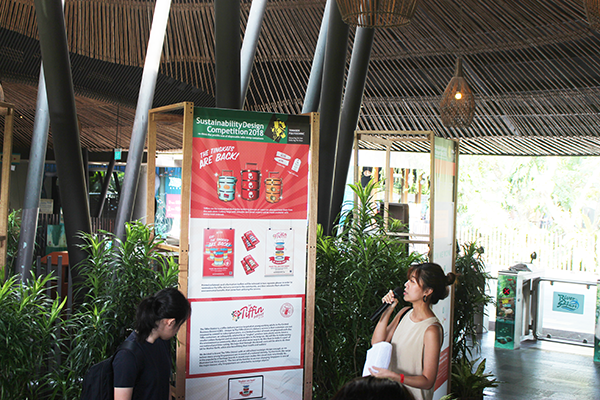TP Students win First Runner-ups in Sustainability Design Competition
Post Date: 20 Nov 2018
 PHOTO: Thaddeus Chea
PHOTO: Thaddeus Chea
Two students from Temasek Polytechnic’s Diploma in Communication Design clinched the first runner-up position at the awards ceremony for the Sustainability Design Competition 2018 held on October 1, organised jointly by the polytechnic with Wildlife Reserves Singapore (WRS).
Melissa Ng and Stella Ng were placed first runner-ups in the competition for their idea of ‘The Tiffin District’, a concept that combines the traditional Chinese Tingkat (reusable metal containers for storing food) and the new convenience of delivery food services.
Their conceptualised service allows for consumers to acquire take-away food using uniquely designed Tingkats. These tingkats can, of course, be reused, which helps to decrease carbon footprint and the amount of disposable waste produced. Used tingkats can be dropped off at various drop off points around the Central Business District, as the main target audience are office workers.
Because of the fact that it is a simple food delivery service, said Melissa, people no longer have to go out of their way to get their meals while in the office.
The Design Competition was part of an effort by WRS to promote their core values – “ETHICS”, standing for Excellence, Teamwork, Hospitality, Integrity, Care for wildlife, and Sustainability. This is also why they decided to host the event in October, which is known internationally as the Sustainability Month.
The purpose of this competition was to see how youths can solve environmental problems in a creative manner. Foo Wan Xuan, the WRS project manager in charge of the challenge, said: “Youths are firstly very creative, they are people who have a lot of ideas but they have nowhere to showcase their talents.”
“We wanted to tap on this potential so that's why we decided to engage youths, and get them to think about how they can create a more sustainable future.”
Foo also stated that she’s willing to help students actualise their projects, “There are some projects that are very easily rolled out, like the recycling marathon. We can actually use this in normal settings like community centres and organisations to encourage people to start recycling.”
“They’re ideas that are easy to implement, as for the projects that are product designs and the such, we are open to the idea if let’s say, bring the students together with companies who are potentially interested in funding the product or the service to have a conversation,” added Foo.
By: Nakanishi Shoi
